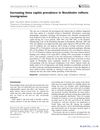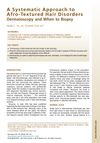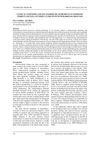 4 citations,
March 2023 in “Current Oncology”
4 citations,
March 2023 in “Current Oncology” Scalp cooling is the only FDA-approved method to prevent hair loss from chemotherapy, but other treatments like minoxidil and PRP are being tested.
[object Object]  February 2024 in “Scientific Reports”
February 2024 in “Scientific Reports” Topical minoxidil and dietary supplements improved hair regrowth in children with hair loss from chemotherapy.
 December 2023 in “Trials”
December 2023 in “Trials” The trial is testing if a helmet that uses light can prevent hair loss during chemotherapy.
 September 2022 in “Concilium”
September 2022 in “Concilium” Scalp cooling effectively prevents chemotherapy-induced hair loss but requires better pain management.
 105 citations,
December 2009 in “Archives of dermatology”
105 citations,
December 2009 in “Archives of dermatology” A specific drug can help treat Lichen Planopilaris, a condition causing permanent hair loss.
 1 citations,
May 1965 in “Medical Clinics of North America”
1 citations,
May 1965 in “Medical Clinics of North America” Hair growth dysfunction involves various conditions with limited treatment options.
 52 citations,
January 2004 in “Medical mycology”
52 citations,
January 2004 in “Medical mycology” The rise in tinea capitis cases in Stockholm is linked to increased African immigration.
 16 citations,
April 2014 in “Dermatologic Clinics”
16 citations,
April 2014 in “Dermatologic Clinics” Dermatoscopy helps diagnose hair and scalp disorders in people with Afro-textured hair, but more research is needed for better understanding and treatment.
 1 citations,
December 2017 in “Research for Rural Development/Research for Rural Development (Online)”
1 citations,
December 2017 in “Research for Rural Development/Research for Rural Development (Online)” Neutered ferrets often develop hyperadrenocorticism, with symptoms like hair loss and lethargy, and androstenedione is a key indicator for diagnosis.
 3 citations,
May 2018 in “Biochemical and Biophysical Research Communications”
3 citations,
May 2018 in “Biochemical and Biophysical Research Communications” iNOS contributes to hair loss in obese diabetic mice and blocking it may encourage hair growth.
 2 citations,
August 2019 in “International Journal of Applied Pharmaceutics”
2 citations,
August 2019 in “International Journal of Applied Pharmaceutics” Niosomes can effectively deliver Superoxide Dismutase to hair follicles, potentially helping prevent hair loss.
 1 citations,
September 2023 in “Journal of Investigative Dermatology”
1 citations,
September 2023 in “Journal of Investigative Dermatology” Melatonin may protect hair follicle cells from damage caused by a chemotherapy drug.
 April 2019 in “Journal of The American Academy of Dermatology” January 2023 in “Aesthetic Plastic Surgery”
April 2019 in “Journal of The American Academy of Dermatology” January 2023 in “Aesthetic Plastic Surgery”  July 2023 in “Dermatology practical & conceptual”
July 2023 in “Dermatology practical & conceptual” Low dose oral minoxidil helped treat long-term hair loss caused by chemotherapy in 15 patients.
[object Object] May 2019 in “Journal of clinical oncology” Radiation therapy with chemotherapy can cause severe, long-lasting hair loss.

A woman regrew her hair after receiving injections of special cell-derived vesicles.
 3 citations,
June 2023 in “The journal of investigative dermatology/Journal of investigative dermatology”
3 citations,
June 2023 in “The journal of investigative dermatology/Journal of investigative dermatology” The conclusion suggests that focusing on certain cellular pathways may improve the prevention and repair of hair loss caused by radiotherapy.
5 citations,
January 2015 in “Case reports in medicine” A baby was diagnosed with IFAP syndrome due to a new genetic mutation, showing severe skin and developmental issues.
 4 citations,
April 2016 in “American Journal of Primatology”
4 citations,
April 2016 in “American Journal of Primatology” Where a rhesus macaque used to live can affect its chances of getting alopecia later in life, and females are more likely to be affected than males.
 148 citations,
December 2018 in “Journal of autoimmunity”
148 citations,
December 2018 in “Journal of autoimmunity” Alopecia areata is an autoimmune disease causing patchy hair loss, often with other autoimmune disorders, but its exact causes are unknown.
 67 citations,
May 2010 in “Journal of The American Academy of Dermatology”
67 citations,
May 2010 in “Journal of The American Academy of Dermatology” Some chemotherapy can cause permanent hair loss.
 37 citations,
May 1999 in “Australasian Journal of Dermatology”
37 citations,
May 1999 in “Australasian Journal of Dermatology” Early diagnosis and treatment are crucial for preventing permanent hair loss in various scalp conditions, and while new treatments are promising, more research is needed to evaluate their effectiveness.
 26 citations,
August 2018 in “American Journal of Clinical Dermatology”
26 citations,
August 2018 in “American Journal of Clinical Dermatology” Hair loss in cancer patients can be related to the cancer itself, treatment, or other conditions, and understanding it is important for diagnosis and patient care.
 4 citations,
April 2021 in “Journal of Cosmetic Dermatology”
4 citations,
April 2021 in “Journal of Cosmetic Dermatology” Intradermal injections improve hair density and thickness better, while derma roller is more convenient.
 February 2024 in “PloS one”
February 2024 in “PloS one” Tofacitinib and adalimumab are promising treatments for cicatricial alopecia with few side effects.
 June 2022 in “Al-Azhar International Medical Journal /Al-Azhar International Medical Journal”
June 2022 in “Al-Azhar International Medical Journal /Al-Azhar International Medical Journal” Adding nano fat to hair transplants improves results for scar-related hair loss.
 185 citations,
August 2005 in “Autoimmunity Reviews”
185 citations,
August 2005 in “Autoimmunity Reviews” Alopecia areata is an autoimmune condition causing hair loss due to the immune system attacking hair follicles, often influenced by genetics and stress.
 27 citations,
December 2015 in “Clinical and Experimental Dermatology”
27 citations,
December 2015 in “Clinical and Experimental Dermatology” Diphencyprone helped most patients with alopecia areata regrow some hair.
 16 citations,
November 1992 in “Journal of International Medical Research”
16 citations,
November 1992 in “Journal of International Medical Research” ViviScal®, a food supplement, was found to be highly effective in treating hereditary hair loss in young males, while fish extract showed no impact.


























